阅读练习1
六年级下册语文阅读理解练习 (1)
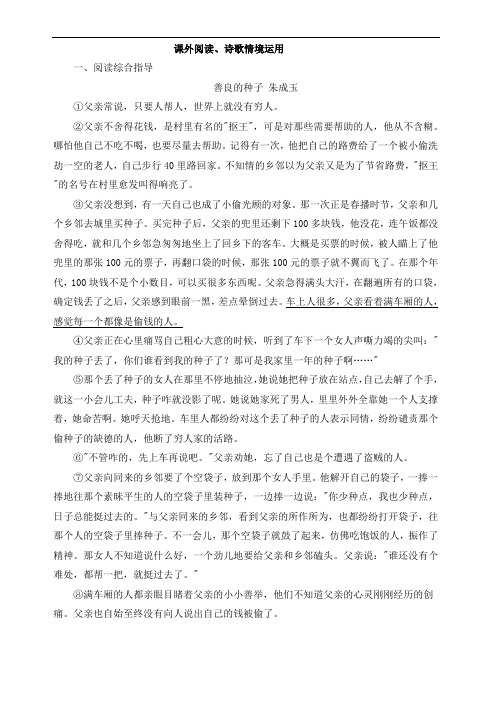
课外阅读、诗歌情境运用一、阅读综合指导善良的种子朱成玉①父亲常说,只要人帮人,世界上就没有穷人。
②父亲不舍得花钱,是村里有名的"抠王",可是对那些需要帮助的人,他从不含糊。
哪怕他自己不吃不喝,也要尽量去帮助。
记得有一次,他把自己的路费给了一个被小偷洗劫一空的老人,自己步行40里路回家。
不知情的乡邻以为父亲又是为了节省路费,"抠王"的名号在村里愈发叫得响亮了。
③父亲没想到,有一天自己也成了小偷光顾的对象。
那一次正是春播时节,父亲和几个乡邻去城里买种子。
买完种子后,父亲的兜里还剩下100多块钱,他没花,连午饭都没舍得吃,就和几个乡邻急匆匆地坐上了回乡下的客车。
大概是买票的时候,被人瞄上了他兜里的那张100元的票子,再翻口袋的时候,那张100元的票子就不翼而飞了。
在那个年代,100块钱不是个小数目,可以买很多东西呢。
父亲急得满头大汗,在翻遍所有的口袋,确定钱丢了之后,父亲感到眼前一黑,差点晕倒过去。
车上人很多,父亲看着满车厢的人,感觉每一个都像是偷钱的人。
④父亲正在心里痛骂自己粗心大意的时候,听到了车下一个女人声嘶力竭的尖叫:"我的种子丢了,你们谁看到我的种子了?那可是我家里一年的种子啊……"⑤那个丢了种子的女人在那里不停地抽泣,她说她把种子放在站点,自己去解了个手,就这一小会儿工夫,种子咋就没影了呢。
她说她家死了男人,里里外外全靠她一个人支撑着,她命苦啊。
她呼天抢地。
车里人都纷纷对这个丢了种子的人表示同情,纷纷谴责那个偷种子的缺德的人,他断了穷人家的活路。
⑥"不管咋的,先上车再说吧。
"父亲劝她,忘了自己也是个遭遇了盗贼的人。
⑦父亲向同来的乡邻要了个空袋子,放到那个女人手里。
他解开自己的袋子,一捧一捧地往那个素昧平生的人的空袋子里装种子,一边捧一边说:"你少种点,我也少种点,日子总能挺过去的。
"与父亲同来的乡邻,看到父亲的所作所为,也都纷纷打开袋子,往那个人的空袋子里捧种子。
四年级下册语文第一至四单元阅读练习
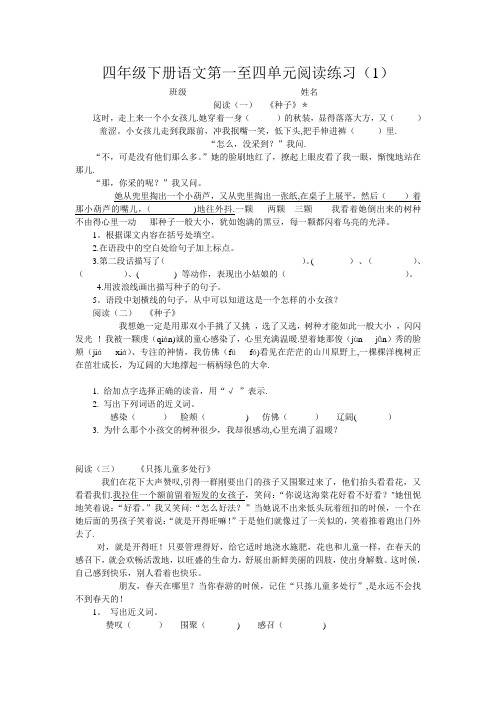
四年级下册语文第一至四单元阅读练习(1)班级姓名阅读(一)《种子》*这时,走上来一个小女孩儿.她穿着一身()的秋装,显得落落大方,又()羞涩。
小女孩儿走到我跟前,冲我抿嘴一笑,低下头,把手伸进裤()里.“怎么,没采到?”我问.“不,可是没有他们那么多。
”她的脸刷地红了,撩起上眼皮看了我一眼,惭愧地站在那儿.“那,你采的呢?”我又问。
她从兜里掏出一个小葫芦,又从兜里掏出一张纸,在桌子上展平,然后()着那小葫芦的嘴儿,()地往外抖.一颗两颗三颗我看着她倒出来的树种不由得心里一动那种子一般大小,犹如饱满的黑豆,每一颗都闪着乌亮的光泽。
1。
根据课文内容在括号处填空。
2.在语段中的空白处给句子加上标点。
3.第二段话描写了()。
( )、()、()、( ) 等动作,表现出小姑娘的()。
4.用波浪线画出描写种子的句子。
5。
语段中划横线的句子,从中可以知道这是一个怎样的小女孩?阅读(二)《种子》我想她一定是用那双小手挑了又挑,选了又选,树种才能如此一般大小,闪闪发光!我被一颗虔(qián)诚的童心感染了,心里充满温暖.望着她那俊(jùn jǖn)秀的脸颊(jiáxiá)、专注的神情,我仿佛(fúfó)看见在茫茫的山川原野上,一棵棵洋槐树正在茁壮成长,为辽阔的大地撑起一柄柄绿色的大伞.1. 给加点字选择正确的读音,用“√”表示.2. 写出下列词语的近义词。
感染()脸颊() 仿佛()辽阔( )3. 为什么那个小孩交的树种很少,我却很感动,心里充满了温暖?阅读(三)《只拣儿童多处行》我们在花下大声赞叹,引得一群刚要出门的孩子又围聚过来了,他们抬头看看花,又看看我们.我拉住一个额前留着短发的女孩子,笑问:“你说这海棠花好看不好看?"她忸怩地笑着说:“好看。
”我又笑问:“怎么好法?”当她说不出来低头玩着纽扣的时候,一个在她后面的男孩子笑着说:“就是开得旺嘛!”于是他们就像过了一关似的,笑着推着跑出门外去了.对,就是开得旺!只要管理得好,给它适时地浇水施肥,花也和儿童一样,在春天的感召下,就会欢畅活泼地,以旺盛的生命力,舒展出新鲜美丽的四肢,使出身解数。
英语阅读练习:记叙文一
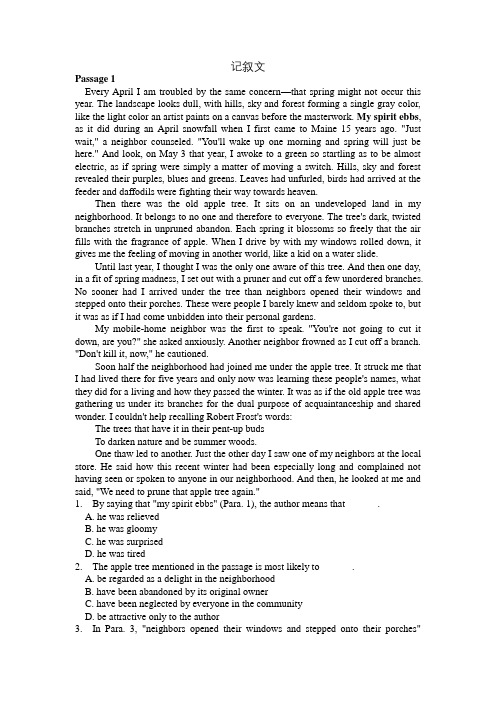
记叙文Passage 1Every April I am troubled by the same concern—that spring might not occur this year. The landscape looks dull, with hills, sky and forest forming a single gray color, like the light color an artist paints on a canvas before the masterwork. My spirit ebbs, as it did during an April snowfall when I first came to Maine 15 years ago. "Just wait," a neighbor counseled. "You'll wake up one morning and spring will just be here." And look, on May 3 that year, I awoke to a green so startling as to be almost electric, as if spring were simply a matter of moving a switch. Hills, sky and forest revealed their purples, blues and greens. Leaves had unfurled, birds had arrived at the feeder and daffodils were fighting their way towards heaven.Then there was the old apple tree. It sits on an undeveloped land in my neighborhood. It belongs to no one and therefore to everyone. The tree's dark, twisted branches stretch in unpruned abandon. Each spring it blossoms so freely that the air fills with the fragrance of apple. When I drive by with my windows rolled down, it gives me the feeling of moving in another world, like a kid on a water slide.Until last year, I thought I was the only one aware of this tree. And then one day, in a fit of spring madness, I set out with a pruner and cut off a few unordered branches. No sooner had I arrived under the tree than neighbors opened their windows and stepped onto their porches. These were people I barely knew and seldom spoke to, but it was as if I had come unbidden into their personal gardens.My mobile-home neighbor was the first to speak. "You're not going to cut it down, are you?" she asked anxiously. Another neighbor frowned as I cut off a branch. "Don't kill it, now," he cautioned.Soon half the neighborhood had joined me under the apple tree. It struck me that I had lived there for five years and only now was learning these people's names, what they did for a living and how they passed the winter. It was as if the old apple tree was gathering us under its branches for the dual purpose of acquaintanceship and shared wonder. I couldn't help recalling Robert Frost's words:The trees that have it in their pent-up budsTo darken nature and be summer woods.One thaw led to another. Just the other day I saw one of my neighbors at the local store. He said how this recent winter had been especially long and complained not having seen or spoken to anyone in our neighborhood. And then, he looked at me and said, "We need to prune that apple tree again."1. By saying that "my spirit ebbs" (Para. 1), the author means that ______.A. he was relievedB. he was gloomyC. he was surprisedD. he was tired2. The apple tree mentioned in the passage is most likely to ______.A. be regarded as a delight in the neighborhoodB. have been abandoned by its original ownerC. have been neglected by everyone in the communityD. be attractive only to the author3. In Para. 3, "neighbors opened their windows and stepped onto their porches"probably because ______.A. they were surprised that someone unknown was pruning the treeB. they wanted to prevented the author from pruning the treeC. they were concerned about the safety of the treeD. they wanted to get to know the author4. Not until last year did the author ______.A. cease to worry about the treeB. become aware of the apple treeC. begin to appreciate the neighborhoodD. make acquaintance with the neighbors5. The author's neighbor mentioned in the last paragraph most cared about ______.A. when spring would arriveB. how to pass the long winterC. the neighborhood gatheringD. the pruning for the apple treePassage 2It's 1 a. m., and I'm in Hong Kong for the first time, sitting in a bar in the Lan Kwai Fong district. I'm waiting for two girls I met on the Internet to show up and take me to their apartment, so my friend Harry and I can stay there for free for a few nights. Having been on flights for the past 24 hours, I am worn out and nervous when they don't arrive on time.But my faith is restored when I hear a thick Chinese accent asking, "Are you Cody?" Even though Jess and Jin are as much strangers to me as anyone else in the bar, I trust them. It seems as natural as being set up by a mutual friend, and, in a sense, that is exactly what is happening.I first learned about last fall from my mom's friend, who was planning on hosting travelers in her home to add a little excitement to life after her oldest son went to college. She recommended I use it for an upcoming trip to Europe.That's how I became one of the millions of surfers who search hosts profiles and send requests—typically as much as a week or as little as a day before arriving in the hosts city—to sleep on those people's couches or on their floor or in a spare bedroom.CouchSurfing requests are not always accepted, as my friend and I learned about seven hours before arriving at the bar in Hong Kong. During our stay in Tokyo, I found out via e-mail that the requests I had submitted that morning to two potential hosts had both been politely declined. One host, had relatives visiting, and the other, was in Macau for the weekend.So, I quickly joined the forum "Last Minute Couch Requests: Hong Kong" and posted a message, which Jess saw. She got in touch with her friend Jin, who had room in her apartment to accommodate two guests. Jess sent us an e-mail, which we received after landing in Hong Kong, offering directions to a meeting place and a phone number. Harry and I could have dug through Jess's list of friends to read up on Jin, but instead we trusted that Jess would not lead us astray.After the girls get to the bar, the four of us go to a rooftop bar, then a club, and finally head back to Jin's apartment. Over the next three days, the girls teach us how to use the public-transportation system and give us directions to popular touristdestinations.To outsiders like, say, my parents, it may be hard to understand why Jin would agree to have two strangers stay at her place, or why we are even trying to couch-surf when hostels are cheap and plentiful in this part of the world. It is because couch surfing isn't just a means of accommodation; it is an entirely new way to travel. You get to see the world through local residents, not hotel gatekeepers or guidebooks. You get to step outside your comfort zones. But what is most profound about the whole experience is the trust that naturally exists. Jin, for instance, gives us a key to her place upon arrival, a common CouchSurfing custom that helps explain why sociologists at Stanford University are now studying the site and its ability to efficiently create trust.While cultural enrichment and adventure are almost a CouchSurfing guarantee, comfort is not. Jin's guest mattress is not quite a quarter of an inch thick, the shower is too complicated for Harry or me to figure out, and the apartment is an eighth-floor walk-up. But it's a tradeoff surfers like me are happy to make.6. Which of the following is TRUE about the friend of the author's mother?A. She got much help from CouchSurfing. com for her last trip.B. She needed company to distract her from missing her son.C. She became a member of last autumn.D. She decided to accommodate travelers in her home for free.7. Why did the author have to post a message on "Last Minute Couch Requests: Hong Kong"?A. Two potential Tokyo hosts had declined his requests.B. He had been rejected by two potential Hong Kong hosts.C. He had stayed in Tokyo for too long a time.D. His previous request had been sent out too late.8. The author didn't examine the reliability of Jin because ______.A. he had no way of contacting herB. he couldn't find any other hostsC. he had much confidence in JessD. he knew about Jess well enough9. According to the passage, CouchSurfing provides travelers with all the following EXCEPT ______.A. comfortable accommodationB. adventurous experiencesC. exotic cultureD. a sense of trust10. The author is most likely to feel that his CouchSurfing experiences are ______.A. disappointingB. worthwhileC. filled with uncertaintyD. dangerousPassage 3I was born in Tuckahoe, Talbot Country, Maryland. I have no accurate knowledge of my age, never having seen any authentic record containing it. By far the larger part of the slaves know as little of their age as horses know of theirs, and it isthe wish of most masters within my knowledge to keep their slaves thus ignorant. I do not remember having ever met a slave who could tell of his birthday. They seldom come nearer to it than planting-time, harvesting, springtime, or fall-time. A lack of information concerning my own was a source of unhappiness to me even during childhood. The white children could tell their ages, I could not tell why I ought to be deprived of the same privilege. I was not allowed to make any inquiries of my master concerning it. He considered all such inquiries on the part of a slave improper and impertinent. The nearest estimate I can give makes me now between twenty-seven and twenty-eight years of age. I come to this, from hearing my master say, some time during 1835, I was about seventeen years old.My mother was named Harriet Bailey. She was the daughter of Issac and Betsey Bailey, both coloured, and quite dark. My mother was of a darker complexion than either my grandmother or grandfather.My father was a white man. He was admitted to be such by all I ever heard speak of my parentage. The opinion was also whispered that my master was my father; but of the correctness of this opinion, I know nothing; the means of knowing was withheld from me. My mother and I were separated when I was but an infant—before I knew her as my mother. It is a common custom, in the part of Maryland from which I ran away, to part children from their mothers at a very early age. Frequently, before the child has reached its twelfth month, its mother is taken from it, and hired out on some farm a considerable distance off, and the child is placed under the care of an older woman, too old for field labor. For what this separation is done, I do not know, unless it be to hinder the development of the child's affection towards its mother.11. The author did not know exactly when he was born becauseA. he did not know who his mother was.B. there was no written evidence of it.C. his master did not tell his father.D. nobody on his farm knew anything about it.12. In the mid-nineteenth century, slaves oftenA. marked their birthdays by the season.B. did not really care how old they were.C. forgot the exact time when they were born.D. pretended not to know each other's birthdays.13. The author's mother told himA. his father was black.B. his father was white.C. nothing about his father.D. his master was his father.14. According to the passage, when the author was very young his motherA. ran away.B. was light-skinned.C. had several children.D. was sent to work elsewhere.A B C D15. The author had not spent much time with hisA. mother.B. master.C. grandfather.D. grandmother.A B C DPassage 4Flying across the country the other day, I sat next to a retired Air Force colonel, and we had a pleasant conversation about love of flying, travel and grandchildren and for him, of retirement itself. "Yeah," he said, "there's only one thing that would make me give this up. ""What's that?""If Hillary or Jan Fonda runs for president, I'm going to work full time to beat her."I told him I knew Hillary. She doesn't even need a last name now. And she's no Jane Fonda."Well," I concluded before we began talking about planes and kids again, "I think you are going to get your chance. I think she's going to run. "I once wrote, with total sincerity, that I thought Hillary Rodham Clinton had the political instincts of a stone. I also wrote that I thought she had marginalized her husband's chances of being an important president.He blew that by naming his wife to head the task force to work out a national plan, and she decided to work in secret with battalions of "experts" who came up with a plan four times as long as the European constitution.Then, after taking her lumps for that, she decided to run, as a Democrat, for the US Senate from New York, a state she had always thought was a nice place to visit.She is now far and away the Democratic front-runner for president in 2008. Her national numbers are getting better, inch by inch, day by day. Now, a slight majority—52 percent in a couple of polls—say they are likely or very likely to vote for Hillary for president. True, 47 percent, including my friend the colonel, still say "Never." But her national approval-disapproval rate is now about 55 to 39, compared with 46 to 48 for President Bush.The odds are still against her. So are most of the odds-makers, beginning with Joe Klein of Time Magazine, chronicler of the Clintons in fact and fiction. He believes a Hillary candidacy will polarize the country the way the reign of the Clintons polarized us in the 1990s.16. One subject that the author and the colonel didn't talk about during their conversation is ______.A. love of flying and travelB. life after retirementC. Hillary's running for presidencyD. popularity of President Bush17. The writer implies in this passage that ______.A. Jane Fonda is going to compete with Hillary in the presidential electionB. Hillary did so much for her husband to be an important presidentC. Hillary is gaining more and more support despite the odds against herD. the colonel will work for Hillary if she is to run for presidency18. The word "polarize" in the last paragraph probably means ______.A. personalizeB. popularizeC. unite into one groupD. divide into opposing sides19. According to the passage, the author's attitude toward Hillary candidacy is ____.A. neutralB. ironicalC. approvingD. disapproving20. The title that can best sum up the whole passage is ______.A. The Rise and Rise of HillaryB. Hillary's Political CareerC. People's Ambivalence Toward Hillary CandidacyD. A Retired Colonel's View on Hillary's Running for PresidencyPassage 5After breakfast the boys wandered out into the playground. Here the day—boys were gradually assembling. They were sons of the local clergy, of the officers at the depot, and of such manufacturers or men of business as the old town possessed. Presently a bell rang, and they all trooped into school. This consisted of a large, long room at opposite ends of which two under-masters conducted the second and third forms, and of a smaller one, leading out of it, used by Mr Watson, who taught the first form. To attach the preparatory to the senior school these three classes were known officially, on speech days and in reports, as upper, middle, and lower second. Philip was put in the last. The master, a red-faced man with a pleasant voice, was called Rice; he had a cheerful manner with boys, and the time passed quickly. Philip was surprised when it was quarter to eleven and they were let out for ten minutes' rest.The whole school rushed noisily into the playground. The new boys were told to go into the middle, while the others stationed themselves along opposite walls. They began to play Pig in the Middle. The old boys ran from wall to wall while the new boys tried to catch them: when one was seized and the mystic words said—one, two, three, and a pig for me—he became a prisoner and, turning sides, helped to catch those who were still free. Philip saw a boy running past and tried to catch him but his limp gave him no chance; and the runners taking their opportunity, made straight for the ground he covered. Then one of them had the brilliant idea of imitating Philip's clumsy run. Other boys saw it and began to laugh; then they all copied the first; and they ran round Philip, limping comically, screaming with shrill laughter. They lost their heads with the delight of their new amusement, and choked with helpless merriment. One of them tripped Philip up and he fell, heavily as he always fell, and cut his knee. They laughed all the louder when he got up. A boy pushed him from behind, and he would have fallen again if another had not caught him. The game was forgotten in the entertainment of Philip's deformity. Philip was completely scared. He could not make out why they were laughing at him. His heart beat so that he could hardly breathe, and he was more frightened than he had ever been in his life. He stood still stupidly while the boys ran round him, mimicking and laughing; they shouted to him to try and catch them; but he did not move. He did not want them to see him runany more. He was using all his strength to prevent himself from crying.21. From the beginning of the passage we learn that ______.A. the school had only three classesB. the school only accepted day-boysC. some pupils came from the local areaD. Philip's class was part of the senior school22. What was Philip's reaction to his class?A. He seemed to have enjoyed it.B. He found his class surprising.C. He thought class was too short.D. He wanted to change class.23. In the game Philip lost his ground because ______.A. the game wasn't fit for new boys like himB. the playground wasn't big enough for the gameC. he did not know the rules of the gameD. he could not run as quickly as other boys24. What did the boys do after Philip lost his ground?A. They continued with the game.B. They stopped to make fun of" him.C. They changed to another game.D. They stopped and went inside.25. How did Philip feel in the end?A. He was ashamed of himself.B. He was very nervous.C. He was really horrified.D. He felt himself stupid.。
阅读理解记叙文练习题 经典1
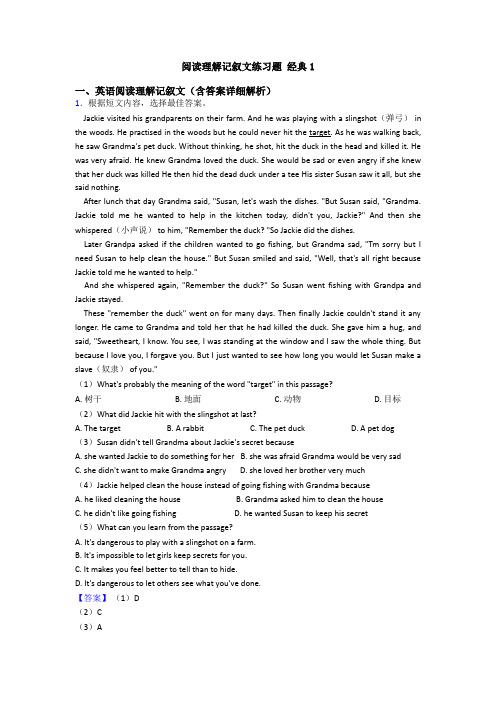
阅读理解记叙文练习题经典1一、英语阅读理解记叙文(含答案详细解析)1.根据短文内容,选择最佳答案。
Jackie visited his grandparents on their farm. And he was playing with a slingshot(弹弓) in the woods. He practised in the woods but he could never hit the target. As he was walking back, he saw Grandma's pet duck. Without thinking, he shot, hit the duck in the head and killed it. He was very afraid. He knew Grandma loved the duck. She would be sad or even angry if she knew that her duck was killed He then hid the dead duck under a tee His sister Susan saw it all, but she said nothing.After lunch that day Grandma said, "Susan, let's wash the dishes. "But Susan said, "Grandma. Jackie told me he wanted to help in the kitchen today, didn't you, Jackie?" And then she whispered(小声说) to him, "Remember the duck? "So Jackie did the dishes.Later Grandpa asked if the children wanted to go fishing, but Grandma sad, "Tm sorry but I need Susan to help clean the house." But Susan smiled and said, "Well, that's all right because Jackie told me he wanted to help."And she whispered again, "Remember the duck?" So Susan went fishing with Grandpa and Jackie stayed.These "remember the duck" went on for many days. Then finally Jackie couldn't stand it any longer. He came to Grandma and told her that he had killed the duck. She gave him a hug, and said, "Sweetheart, I know. You see, I was standing at the window and I saw the whole thing. But because I love you, I forgave you. But I just wanted to see how long you would let Susan make a slave(奴隶) of you."(1)What's probably the meaning of the word "target" in this passage?A. 树干B. 地面C. 动物D. 目标(2)What did Jackie hit with the slingshot at last?A. The targetB. A rabbitC. The pet duckD. A pet dog(3)Susan didn't tell Grandma about Jackie's secret becauseA. she wanted Jackie to do something for herB. she was afraid Grandma would be very sadC. she didn't want to make Grandma angryD. she loved her brother very much(4)Jackie helped clean the house instead of going fishing with Grandma becauseA. he liked cleaning the houseB. Grandma asked him to clean the houseC. he didn't like going fishingD. he wanted Susan to keep his secret(5)What can you learn from the passage?A. It's dangerous to play with a slingshot on a farm.B. It's impossible to let girls keep secrets for you.C. It makes you feel better to tell than to hide.D. It's dangerous to let others see what you've done.【答案】(1)D(2)C(3)A(4)D(5)C【解析】【分析】本文主要讲了Jackie不小心把祖母的宠物鸭用弹弓打死了,他不敢说,但是妹妹看到后一直要挟他,最后他告诉了祖母实情。
2021年精编最新部编版七下语文期中复习《骆驼祥子》语段阅读练习 1(含答案))

初一语文复习迎考系列6(《骆驼祥子》阅读1)(一)在厂子里,他可是交了朋友;虽然不大爱说话,但是不出声的雁也喜欢群飞。
再不交朋友,他的寂寞恐怕就不是他所能忍受的了。
他的烟卷盒儿,只要一掏出来,便绕着圈儿递给大家。
有时候人家看他的盒里只剩下一支,不好意思伸手,他才简截的说:“再买!”赶上大家赌钱,他不象从前那样躲在一边,也过来看看,并且有时候押上一注,输赢都不在乎的,似乎只为向大家表示他很合群,很明白大家奔忙了几天之后应当快乐一下。
他们喝酒,他也陪着;不多喝,可是自己出钱买些酒菜让大家吃。
以前他所看不上眼的事,现在他都觉得有些意思——自己的路既走不通,便没法不承认别人做得对。
朋友之中若有了红白事,原先他不懂得行人情,现在他也出上四十铜子的份子,或随个“公议儿”①。
不但是出了钱,他还亲自去吊祭或庆贺,因为他明白了这些事并非是只为糟蹋钱,而是有些必须尽到的人情。
在这里人们是真哭或真笑,并不是瞎起哄。
那三十多块钱,他可不敢动。
弄了块白布,他自己笨手八脚的拿个大针把钱缝在里面,永远放在贴着肉的地方。
不想花,也不想再买车,只是带在身旁,作为一种预备——谁知道将来有什么灾患呢!病,意外的祸害,都能随时的来到自己身上,总得有个预备。
人并不是铁打的,他明白过来。
快到立秋,他又拉上了包月。
这回,比以前所混过的宅门里的事都轻闲;要不是这样,他就不会应下这个事来。
他现在懂得选择事情了,有合适的包月才干;不然,拉散座也无所不可,不象原先那样火着心往宅门里去了。
他晓得了自己的身体是应该保重的,一个车夫而想拚命——象他原先那样——只有丧了命而得不到任何好处。
经验使人知道怎样应当油滑一些,因为命只有一条啊!1、从文段中可判断祥子具有怎样性格特点?2、从文段中祥子最看重的是什么东西?为什么?3、祥子对待劳动(拉车)的态度与以前相比发生了什么变化?4、除了虎妞的死亡这一原因外,还有什么原因造成祥子对生活态度的变化?5、从整体看,文段中心是什么?(二)云还没铺满天,地上已经很黑,极亮极热的晴午忽然变成了黑夜似的。
四年级上册阅读专项练习(一)
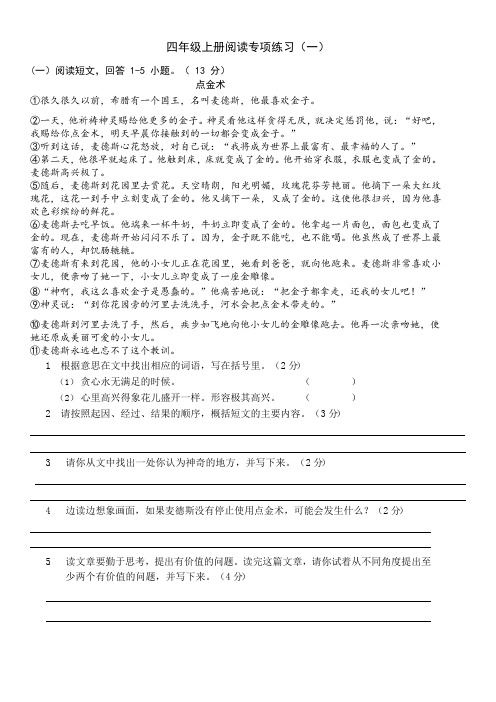
四年级上册阅读专项练习(一)(一)阅读短文,回答 1-5 小题。
( 13 分)点金术①很久很久以前,希腊有一个国王,名叫麦德斯,他最喜欢金子。
②一天,他祈祷神灵赐给他更多的金子。
神灵看他这样贪得无厌,就决定惩罚他,说:“好吧,我赐给你点金术,明天早晨你接触到的一切都会变成金子。
”③听到这话,麦德斯心花怒放,对自己说:“我将成为世界上最富有、最幸福的人了。
”④第二天,他很早就起床了。
他触到床,床就变成了金的。
他开始穿衣服,衣服也变成了金的。
麦德斯高兴极了。
⑤随后,麦德斯到花园里去赏花。
天空晴朗,阳光明媚,玫瑰花芬芳艳丽。
他摘下一朵大红玫瑰花,这花一到手中立刻变成了金的。
他又摘下一朵,又成了金的。
这使他很扫兴,因为他喜欢色彩缤纷的鲜花。
⑥麦德斯去吃早饭。
他端来一杯牛奶,牛奶立即变成了金的。
他拿起一片面包,面包也变成了金的。
现在,麦德斯开始闷闷不乐了。
因为,金子既不能吃,也不能喝。
他虽然成了世界上最富有的人,却饥肠辘辘。
⑦麦德斯有来到花园,他的小女儿正在花园里,她看到爸爸,就向他跑来。
麦德斯非常喜欢小女儿,便亲吻了她一下,小女儿立即变成了一座金雕像。
⑧“神啊,我这么喜欢金子是愚蠢的。
”他痛苦地说:“把金子都拿走,还我的女儿吧!”⑨神灵说:“到你花园旁的河里去洗洗手,河水会把点金术带走的。
”⑩麦德斯到河里去洗了手,然后,疾步如飞地向他小女儿的金雕像跑去。
他再一次亲吻她,使她还原成美丽可爱的小女儿。
⑪麦德斯永远也忘不了这个教训。
1.根据意思在文中找出相应的词语,写在括号里。
(2 分)(1)贪心永无满足的时候。
()(2)心里高兴得象花儿盛开一样。
形容极其高兴。
()2.请按照起因、经过、结果的顺序,概括短文的主要内容。
(3 分)3.请你从文中找出一处你认为神奇的地方,并写下来。
(2 分)4.边读边想象画面,如果麦德斯没有停止使用点金术,可能会发生什么?(2 分)5.读文章要勤于思考,提出有价值的问题。
读完这篇文章,请你试着从不同角度提出至少两个有价值的问题,并写下来。
小升初语文专题练习卷:现代文阅读(一)(Word版,含答案)
小升初语文专题练习卷:现代文阅读(一)姓名:__________ 班级:__________考号:__________1.阅读抬起头来做人那一年,有个小男孩不过八九岁。
一天,他拿着一张筹款卡回家,很认真地对妈妈说∶"学校要筹款,每个学生都要叫人捐钱。
" 对小孩来说,直接想到的"人",就是自己的家长。
小男孩的妈妈取出5块钱,交给他,然后在筹款卡上签名。
小男孩静静地看着妈妈签名,想说什么,却没开口。
妈妈注意到了,问他∶"怎么啦?" 小男孩低着头说∶"昨天,同学们把筹款卡交给老师时,捐的都是100块、50块。
"小男孩就读的是当地著名的"贵族学校",校门外,每天都有小轿车等候放学的学生。
小男孩的班级是在全年级最前面的。
班上的同学,不是家里捐献较多,就是成绩较好。
当然,小男孩不属于前者。
那一天,小男孩说,不是想和同学比多,也不是自卑。
他一向都认真对待老师交代的功课,这一次,也想把自己的"功课"做好。
况且,学校还举行班级筹款比赛,他的班已领先了,他不想拖累整班。
妈妈把小男孩的头托起来说∶"不要低头,要知道,你同学的家庭背景,非富则贵。
我们必须量力而为,我们所捐的5块钱,其实比他们的500块钱还多。
你是学生,只要以自己的品学尽力为校争光,就是对学校最好的贡献了。
"第二天,小男孩抬起头,从座位走出去,把筹款卡交给老师,当老师在班上宣读每位同学的筹款成绩时,小男孩还是抬起头来。
自此以后,小男孩在达官贵人、富贾豪绅的面前,一直抬起头来做人。
妈妈说的那一番话,深深地刻在小男孩的心里。
那是生平第一次,他面临由金钱来估量人的"成绩"的无言教育。
非常幸运,就在这一次,他学习到"捐"的意义,以及别人所不能"捐"到的、自己独一无二的价值。
四年级语文阅读练习一
四年级 一、阅读《普罗米修斯》(片断)众神的领袖宙斯得知普罗米修斯从天上取走火种的消息以后,气 急败坏,决定给普罗米修斯以最严厉的惩罚,吩咐火神立即执行。
火神很敬佩普罗米修斯,悄悄对他说:“只要你向宙斯承认错误, 归还火种,我一定请求他饶恕你。
”普罗米修斯摇摇头 坚定地回答( ② (立场、主张、意志等)稳定坚强,不动摇。
③ 呼吸急促,十分狼狈。
形容十分慌张或恼怒。
3、火神为什么敬佩普罗米修斯?( 3分)4、请你代表人类对普罗米修斯说几句话。
(3分) 二、阅读《记金华的双龙洞》片段,回答问题。
内洞一团漆黑,什么都看不见。
工人提着汽油灯,也只能照见小 小的一块地方,余外全是昏暗,不知道有多么宽广。
工人咼咼举起汽 油灯,逐一指点洞内的景物。
首先当然是蜿蜒在洞顶的双龙,一条黄 龙,一条青龙。
我顺着他的指点看,有点儿像。
其次是些石钟乳和石 笋_这是什么一那是什么一大都依据形状想象成神仙_动物以及宫室_器 用_名目有四十多_这些石钟乳和石笋,形状变化多端,再加上颜色各 异,即使不比作什么,也很值得观赏。
在洞里走了一转,觉得内洞比外洞大得多,大概有十来进房子那 么大。
泉水靠着右边缓缓地流,声音轻轻的。
上源在深黑的石洞里。
1、 “石笋”的“笋”字用音序查字法,应查字母();用部首查字 法应查( )部,再查( )画。
(3分)2、 请在文中的横线上加上标点符号。
(2分)3、 在文中找出下列词语的近义词。
(2分)观看( ) 黑暗( )4、 用“一一”画出写内洞很黑的句子。
(2分)5、 用“ ”画出写内洞很宽的句子。
(2分)为人类造福有什么错我可 以忍受各种痛苦但绝不会承认错误更不会归还火种1 、把文中缺少的标点符号补充完整2、根据意思写词语。
(3分)①敬重佩服。
(4 分)6、结合短文内容,你能说说金华双龙洞名字的由来吗?(2分)7、洞内石钟乳、石笋众多,造型奇特、颜色各异,你能想象其中的两种也将它们比作什么吗?(2分)第一种:_______________________________________________________第二种:_______________________________________________________ 三、阅读《迷人的海滨夏夜》,回答问题。
四年级阅读专项(一)(答案版)
四年级阅读专项(一)一、阅读短文,完成练习。
1突然)搅动,倒映在水中的石桥、楼屋、树影,还有天上的云彩和飞鸟,都被这不慌不忙的木橹搅碎,碎成斑斓的光点,迷离闪烁,犹如在风中漾动的一匹长长的彩绸,没有人能描绘它朦胧炫目的花纹……2有什么事情比在周庄的小河里泛舟更富有诗意呢?小小的木船,在窄窄的河道中缓缓滑行,拱形的桥孔一个接一个从头顶掠过。
贞丰桥,富安桥,双桥……古老的石桥,一座有一座的形状,一座有一座的风格,过一座桥,便换了一道风景。
站在桥上的行人低头看河里的船,坐在船上的乘客抬头看着桥上的人,相看两不厌,双方的眼帘中都是动人的景象。
3周庄的河道呈“井”字形,街道和楼宅被河分隔。
然而河上有桥,石桥(巧合巧妙)地将古镇连缀为一体。
据说,当年的大户人家,能将船划进家门,大宅后院,还有泊船的池塘。
这样的(精致景象),大概只有在威尼斯才能见到。
一个外乡人,来到周庄,印象最深的莫过于这里的水,以及一切和水连在一起的景物。
1.在括号里选择合适的词语。
2.“什么比在周庄的小河里泛舟更富有诗意呢?”这句话是反问句,这句话的作用是(1)作者强调在周庄的小河里泛舟最富有诗意,(2)同时也引起读者的思考——如何有诗意。
3.找出在周庄泛舟有诗意的景物。
(第二自然段)古老的形状风格不同的石桥;桥上的行人,船上的乘客。
这些景物就如同诗中所描绘的一样,充满诗情画意。
4.你如何理解“这样的景象,大概只有在威尼斯才能见到”这句话?这是对周庄水乡整体的高度评价。
5.给短文选择一个合适的题目。
A.美丽的周庄B.周庄水韵C.我爱周庄二、阅读短文,完成练习。
儿子的礼物1今年春节,我生平第一次收到儿子的礼物——一块德芙巧克力,把那块东西放在我手心里时,儿子的表情显现出从未有过的辉煌。
2儿子二十岁了,在一个自修大专班读书,钱是他业余打工挣来的。
他在一家卡拉ok厅当服务员,从晚上6点干到午夜12点,第二天一早,赶两趟车去学校上课。
打工期间,他每晚要打扫三间包房,洗很多茶杯,给客人倒茶送水,递吃递喝,直至深夜。
课标人教版小学语文三年级下册课外阅读练习一答案(1)
课标人教版小学语文三年级下册课外阅读练习一答案一粒种子一粒种子睡在泥土里。
他醒过来,觉得很暖和,就把身子挺一挺。
他有点儿渴,喝了一口水,觉得很舒服,又把身子挺一挺。
春风轻轻地吹着。
种子问蚯蚓:外边是什么声音?蚯蚓说:那是春风。
春风在叫我们到外边去。
一粒种子睡在泥土里。
他醒过来,觉得很暖和,就把身子挺一挺。
他有点儿渴,喝了一口水,觉得很舒服,又把身子挺一挺。
春风轻轻地吹着。
种子问蚯蚓:“外边是什么声音?”蚯蚓说:“那是春风。
春风在叫我们到外边去。
”“外边什么样儿?也这么黑吗?”“不,外边亮得很。
”蚯蚓一边说,一边往外钻,“我来帮你松一松土,你好钻出去。
”种子听了很高兴,又把身子挺一挺。
春风在唱歌,泉水在唱歌,小鸟在唱歌,小孩子也在唱歌。
种子听见外边很热闹,连忙说:“啊,我要赶快出去!”种子又把身子挺一挺,眼前忽然一亮,啊,好一个光明的世界!1、在下面的括号里填上合适的词语。
一()种子一()水一()小鸟一()蚯蚓一()春风一()小朋友2、找出文中的一组近义词和一组反义词:( )—()()—()3、短文中与“忽然一亮”相照应的一个词是____ ____。
4、读一读,想一想,短文中哪个词语表现出种子正在生长?()5、想一想,种子发芽需要哪些条件?()6、这篇短文讲了一个什么故事?_____________________________________________________________________ _拾贝的小女孩辽阔的海滩上,潮水退了。
一个拾贝的渔家小女孩,明亮的黑眸子搜寻着彩色的贝壳。
突然,她停住了脚步。
——在脚下的沙滩上,一条银闪闪的小鱼在痛苦地蹦跳着。
头上的太阳,无情地蒸发着泥洼里的海水,小鱼在干涸中痉挛。
她似乎听到了小鱼越来越响的哭声。
她的目光停滞了,流露出同情,充满了怜悯。
她弯下腰,小心翼翼地用双手捧起了这条小鱼。
小鱼在她的手里蹦跳着。
她轻舒一口气,直起腰。
慢慢地、一步一个脚印地走向大海边。
- 1、下载文档前请自行甄别文档内容的完整性,平台不提供额外的编辑、内容补充、找答案等附加服务。
- 2、"仅部分预览"的文档,不可在线预览部分如存在完整性等问题,可反馈申请退款(可完整预览的文档不适用该条件!)。
- 3、如文档侵犯您的权益,请联系客服反馈,我们会尽快为您处理(人工客服工作时间:9:00-18:30)。
1 Chapter One RECOGNIZING THE MAIN IDEA Probably the most useful skill you can develop that will improve both your reading comprehension and your performance on tests in class and later on standardized national exams is recognizing main ideas. In nearly all tests covering reading materials assigned in class you are expected to demonstrate that you can identify the subject that a reading selection is about, whether it is a paragraph, an essay, a chapter, or a book, without being misled by supporting details or ideas. The main idea, controlling idea, or central idea all means the same thing. It is simply the main point the author is trying to get across to the reader. HOW TO RECOGNIZE THE MAIN IDEA You may recognize the main idea in a paragraph or a passage in several ways. 1. The significance of its content or the force with which it is expressed. No event has had greater influence on this nation than the tragic death of John F. Kennedy. 2. Summation of the passage’s content. These statements all prove that use of the death penalty is not a deterrent in any way to crimes of violence. 3. An idea expressed as a well-said, formal-sounding statement and a complete thought. Air pollution in our big cities has become the number one urban health problem. 4. If the passage seems to have only one general point, it includes the main idea. If it has two or more seemingly equal general points, the relation between them includes the main idea. First general point: We have a major shortage of large-denomination paper currency in this country. Second general point: Drug dealers are hoarding large-denomination bills. Main idea: Because drug dealers are hoarding large-denomination bills, we have a shortage of these bills in circulation in the United States. 2
THE TOPIC, THE TOPIC SENTENCE, AND THE MAIN IDEA Sometimes we confuse the topic and the topic sentence with the main idea. To avoid this confusion, keep these ideas in mind. 1. The topic is the subject that the passage is about in the most general sense. It may be expressed in a word or a phrase. War, abortion, civil rights, water, safety, pain: these are all topics, not main ideas. 2. The topic sentence in a paragraph (or the thesis statement in a long passage) includes the main idea. It is the sentence in the passage that best expresses the subject that the entire passage is about. The topic sentence always mentions the topic and then makes a strong statement or a claim about the topic. Generally, the topic sentence is easily identified because it sticks out by summing up the main idea in the passage. It is a mistake, however, to assume that one of the answer choices on a test will be a word-for-word duplication of a topic sentence. Also remember that unfortunately, and contrary to what we used to be taught, the topic sentence is not always the first sentence in the paragraph. It may be the first sentence, but it could be anywhere. It may not even be stated --- it may be implied. 3. The main idea is always expressed as a complete thought in a complete sentence. This primary idea if the passage, the main idea, may also be stated in different words and in many locations. The main idea is the important one, no matter how it is expressed. THE IMPORTANCE OF SUMMARIZING The very useful skill of summarizing is often helpful in determining the topic, the topic sentence, or the main idea in a reading selection. Summarizing is a tool for understanding because it focuses on the necessary and eliminates the unnecessary in a passage. These are the six steps in creating a good summary of anything you read. 1. Eliminate unnecessary material. Anything that is trivial should be deleted. 2. Eliminate material which is important but which is redundant. It may be important, but don’t keep including it. Once is enough. 3. Use of summary word instead of a list of items. If a writer discusses a series of related things, such as cars, trucks, and buses, substitute the word vehicles. 4. Use of encompassing word for a series of actions or events. For example, “Alice went to work” summarizes: “ Alice got up and took a shower. She got dressed. She got in the car and drove downtown…”
